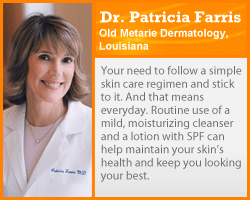Skin goes through a lot of changes as you age — while you may not have had acne, dry skin or skin diseases in the past, it's possible to develop these conditions as your skin matures.
Menopause can make women more prone to breakouts — pores enlarge during this time, making it easier for them to become clogged with sebum and dead skin and cause acne. Women with naturally oily skin may experience more breakouts during menopause than women with normal or dry skin. Hormone fluctuations during menopause can also cause an increase in facial hair in women, which is harmless but may make women feel self-conscious [source:Poirot].
Dry skin can also be an issue for people with mature skin, especially in the winter. Itchiness and dry skin patches are a common occurrence — about 85 percent of older people develop a condition called "winter itch," which occurs when dry indoor heat or cold outdoor temperatures make skin particularly dry and itchy. Using an intensive moisturizer may help ward off dry, flaky skin [source:WebMD].
Skin conditions such as eczema, rosacea and keratoses can also develop in old age. In fact, there are certain types of eczema that appear only in people between the ages of 55 and 65 [source:American Academy of Dermatology]. If you have concerns about your skin and any new textures or growths, talk to your dermatologist.
Mature Skin Care
As your skin changes, so should your skin care routine. First, daily skin care should involve protecting your skin from sun exposure. UV rays accelerate the signs of aging by damaging the elastin and collagen in your skin, so it's important to apply sunscreen with a sun protection factor of at least 15 daily — even on cloudy days. If you're going to be outdoors for an extended period of time, wear a hat and protective clothing. In addition to regular protection from UV light, be sure to check your skin for signs of skin cancer, which can become more evident as you age [source:American Academy of Dermatology]. Wearing sunscreen every day can also help prevent age spots. Although the name may be misleading, age spots aren't caused by aging — they're caused by the skin releasing pigment to protect itself from the sun [source:Hertzig].
Because dryness and itchiness are common characteristics of mature skin, you'll need to moisturize regularly. Certain soaps can further dry your skin, so avoid scented, deodorant and antibacterial soaps — opt for a moisturizing body wash or soap-free cleanser instead [source:Fries]. After showering or bathing, use a towel to pat your skin dry, but leave it a little damp. Then apply a moisturizer within three minutes to help lock in moisture [source:American Academy of Dermatology]. If your skin is especially dry, try using a humidifier in your home to put moisture back into the air [source:WebMD].
Anti-aging products that contain collagen and elastin, proteins that keep skin firm and flexible, can help reduce fine lines and wrinkles [source:Mayo Clinic]. You can also try anti-aging moisturizers that contain alpha-hydroxy acids, retinoids or vitamin C. Alpha-hydroxy acids help lift the top layer of dead skin cells to reduce the appearance of fine lines, and these acids may also stimulate collagen production. Retinoids reduce wrinkles and repair sun damage, and vitamin C can increase collagen production and protect skin from UV rays [source:Bouchez].





